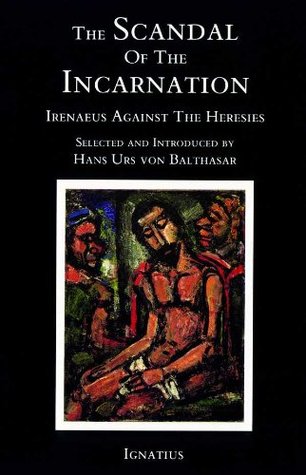More on this book
Kindle Notes & Highlights
Started reading
June 13, 2020
Only when matter, Christ’s very body, is safeguarded in God, is man redeemed.
Irenaeus regards the Eucharist as the pledge of redemption:
The Son of God became the Son of Man, so that through Him we might receive adoption.
In His immeasurable love, He became what we are in order to make us what He
It required the Mediator of God and men, through His kinship with both, to bring back both to friendship and concord, presenting man to God, revealing God to man.
But how could we be united to incorruptibility and immortality without incorruptibility and immortality first becoming what we are,
perishable putting on imperishability,
(cf 1 Cor ...
This highlight has been truncated due to consecutive passage length restrictions.
Through the Incarnation the image of God is shown forth (103) The truth of this was shown when the Word of God became man, assimilating
Himself to man and man to Himself, so that, by His resemblance to the Son, man might become precious to the Father.
was said that man was made in the image of God...
This highlight has been truncated due to consecutive passage length restrictions.
Man brought back by persuasion, not violence
The Incarnation of the Word fulfils God’s first plan
That is why, at the end, ‘not by the will of the flesh or the will of a man’, but by the good pleasure of the Father, the Hands of God made the living Man, so that Adam might come into the image and likeness of God.
There was no other way by which we could learn the things of God than for our Teacher,
No other could have revealed to us the secrets of the Father, none but the Father’s very own Word.
the saving Word made Himself precisely what lost man was,
by His own act bringing man into communion with Himself and obtaining man’s salvation.
He too, therefore, had flesh and blood, recapitulating in Himself not something else, but that original handiwork of the Father,
When He became incarnate and was made man, He recapitulated in Himself the long history of mankind
and, in that summing up, procured for us the salvation we lost in Adam.
(cf Rom 5:14),
because the Word, the maker of all things, did a preliminary sketch in Adam of what, in God’s plan, was to come to the human race through the Son of God.
God arranged it so that the first man was animal in nature and saved ...
This highlight has been truncated due to consecutive passage length restrictions.
Since the Saviour existed already, the one to be saved had to be brought into existence, so ...
This highlight has been truncated due to consecutive passage length restrictions.
be in...
This highlight has been truncated due to consecutive passage length restrictions.
Everything made by Him has received a beginning, and everything with a beginning is liable to dissolution, is subject to, and in need of, the One who created it.
The newly created cannot be uncreated.
God had the power to give man perfection from the beginning, but man was incapable of receiving it, because he was an infant.
He did not do this for His own sake but because of the state of childhood in which man then existed.
He wanted to be received in a way that suited man’s capacity to receive.
By His foreknowledge, He knew the frailty of man and what would result from it,
He will triumph over the substance of created nature.
God permitted man to be swallowed by the great monster who was the author of transgression. He did not want man to be devoured and utterly destroyed; He was simply premeditating and preparing the gaining of salvation by the Word through ‘the sign of Jonah’
Why does his goodness fall short of saving all men?.
The Eucharist is based on creation
The Eucharistic Sacrifice presupposes the Trinity
‘Recapitulation’ describes God’s objective plan of salvation:
unity of body and soul is fundamental to the objective plan of salvation as revealed from above:
The complete man is a mixture and a union: the soul, which has received the Spirit of the Father, mixed with the flesh fashioned in the image of God . . .
The ‘breath of life’ (cf Gen 2:7), which makes man an animated [‘psychic’] being, is not the same as the ‘life-giving Spirit’ (cf 1
Cor 15:45), which makes him spiritual.


